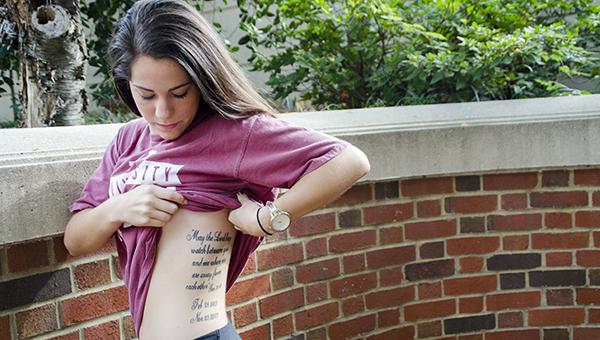With a generation of inked up adolescents on the rise, tattoos are more accessible than ever. Photography-based sites such as Pinterest, Tumblr, Instagram and Flickr have given exposure to tattoo artists, enabling them to connect with new clientele.
Danielle Ra’ed and Rachel Mundy, both students at The University of Alabama, have tattoos with personal significance.
“Unfortunately though, my parents will never understand tattoos,” said Ra’ed, a senior majoring in psychology. “They don’t like it. They’re very opposed to arm tattoos, but, I’m sorry Mom and Dad.”
Ra’ed’s most recent tattoo, an Ankh, the Egyptian symbol for life, on her forearm serves as a tribute to a number of Ra’ed’s friends who have recently passed away, she said.
Ra’ed has four other tattoos accompanying the Ankh: a wave, a Sanskrit Om symbol, a Jewish star within an Islamic crescent moon and a third eye, all representing a certain component of inner peace and balance.
“Our parents are from a generation that views tattoos differently than we do,” she said.
Ra’ed is one of many millennials revamping tattoo culture with a twist.
“It’s a form of artistic and self expression now, not an act of rebellion,” she said.
In the new generation of tattoo culture, parental approval seems to be irrelevant to many college students.
“My dad begged me not to get one,” said Mundy, a freshmen majoring in business.
Her tattoo, similar to Ra’ed’s, is a Bible verse to honor her mother, who passed away.
“What we’re seeing in the tattoo shops is a bigger cultural phenomenon,” said Donovan Straighter, tattoo artist at Cloud Nine tattoo parlor in Birmingham.
This “cultural phenomenon” Straighter refered to is the recent dispersal of tattoo culture throughout the young adult community.
Blogs, Pinterest boards, Tumblr sites, Instagram pages and Twitter accounts have been created solely for dispensing tattoo ideas.
“Things come and go, but the most phenomenal change to the tattoo culture has come with the increase usage of social media over the years,” Straighter said.
As people become more familiar and comfortable with the notion of tattoos, some artists worry there will be a decline in the appreciation of what getting a tattoo entails, Straighter said.
“I’m afraid that some of the mystique in getting a tattoo has been lost,” he said. “It’s important to make sure the proper homage is paid to the significance of tattooing.”









